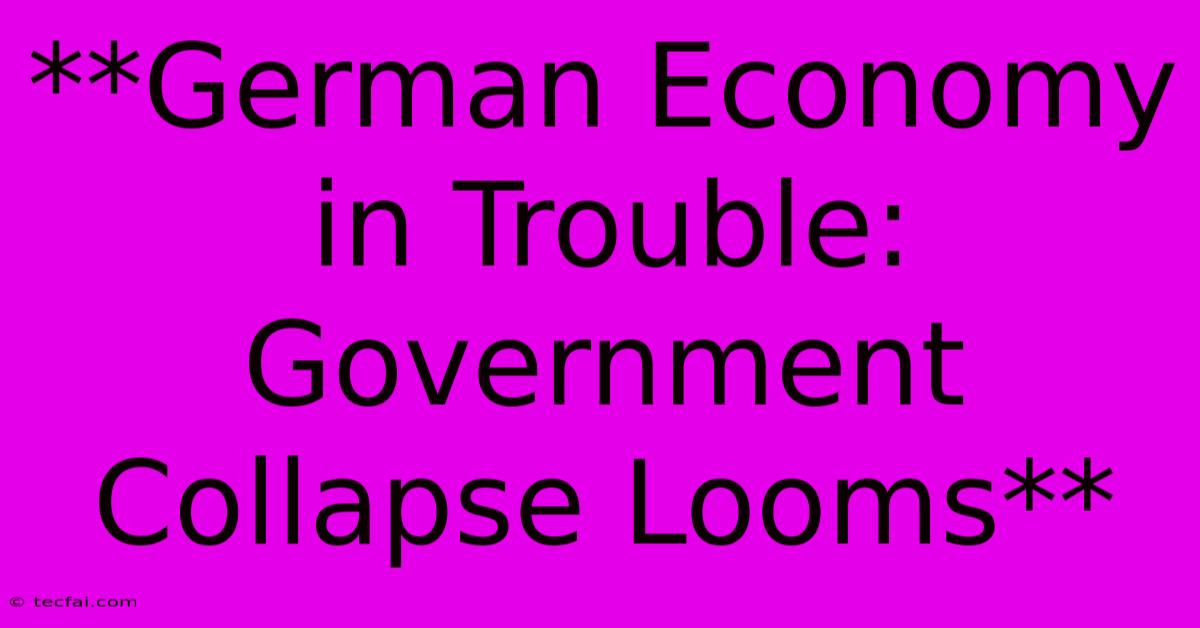**German Economy In Trouble: Government Collapse Looms**

Discover more detailed and exciting information on our website. Click the link below to start your adventure: Visit Best Website tecfai.com. Don't miss out!
Table of Contents
German Economy in Trouble: Government Collapse Looms
The German economy, once a beacon of stability in Europe, is facing a storm of challenges, with a potential government collapse adding to the growing unease. The nation is grappling with soaring inflation, energy insecurity, and a weakening industrial sector, all amidst rising political tensions. This perfect storm threatens to derail Germany's economic recovery and cast a shadow over the entire Eurozone.
The Perfect Storm of Economic Headwinds
Soaring Inflation: Germany, like many other European nations, is facing skyrocketing inflation, driven by the global energy crisis and supply chain disruptions. This is squeezing household budgets, dampening consumer spending, and putting pressure on businesses.
Energy Insecurity: Germany's reliance on Russian gas, which was abruptly curtailed following the invasion of Ukraine, has left the nation vulnerable to energy shortages and price volatility. The government's scramble to secure alternative energy sources is proving costly and slow, adding to the economic burden.
Weakening Industry: Germany's manufacturing sector, the backbone of its economy, is facing headwinds. High energy prices, supply chain disruptions, and a weakening global demand are impacting production and exports. This has raised concerns about Germany's competitiveness and future growth.
Political Turmoil Adds to the Uncertainty
The political landscape in Germany is also increasingly unstable. The coalition government, formed by the Social Democrats (SPD), the Greens, and the Free Democrats (FDP), is struggling to find common ground on key issues, particularly regarding energy policy and economic stimulus measures.
Growing Dissension: Deep divisions within the coalition have led to public bickering and a loss of trust among the parties. This infighting has hampered the government's ability to address the economic challenges effectively, further exacerbating the sense of uncertainty.
Coalition Collapse?: Some political analysts speculate that the current coalition may not survive the ongoing economic and political pressures. A potential collapse would throw the country into a period of political instability and could further undermine confidence in the German economy.
Consequences for the Eurozone
The economic turmoil in Germany is not just a domestic problem; it carries implications for the entire Eurozone. As Europe's largest economy, Germany plays a vital role in driving growth and stability within the bloc.
Spillover Effects: A weakening German economy could lead to a slowdown in the Eurozone as a whole, impacting trade, investment, and growth prospects for other member states.
Eurozone Stability: The political instability in Germany also raises concerns about the Eurozone's long-term stability. A potential government collapse in Germany could further erode confidence in the euro and increase financial market volatility.
The Road Ahead: Difficult Choices
The German government faces a daunting task in navigating the current economic and political crisis. The choices ahead will be difficult, requiring tough decisions on energy policy, fiscal stimulus, and social welfare.
Tough Choices: The government will need to balance the need for short-term economic support with long-term structural reforms to address the underlying challenges facing the German economy.
Global Cooperation: International cooperation will be crucial in addressing the global energy crisis and finding solutions to mitigate the impact of rising inflation.
The German economy is at a crossroads. The government's ability to navigate the current challenges will determine the fate of both the German economy and the Eurozone in the years to come.

Thank you for visiting our website wich cover about **German Economy In Trouble: Government Collapse Looms**. We hope the information provided has been useful to you. Feel free to contact us if you have any questions or need further assistance. See you next time and dont miss to bookmark.
Featured Posts
-
Al Jazeera Hamas Members Discuss Slain Hostage
Nov 08, 2024
-
Skodas Fabia Scala Kamiq Get Monte Carlo Treatment
Nov 08, 2024
-
Interest Rates Drop 0 25 As Fed Acts
Nov 08, 2024
-
Manchester United Paok Europa League Wedstryd
Nov 08, 2024
-
Tottenham Hotspur Vs Opponent Europa League Match
Nov 08, 2024
